'Twilight Zone' writer challenged prejudice
Rod Serling, a Unitarian, confronted prejudice with innovative television scripts.
Even now, humming The Twilight Zone’s eerie theme song is easy code for anything that falls along the creepy edges of everyday life. Serling, who conceived, narrated, and wrote 92 of the show’s 156 scripts, is almost as recognizable.
Serling was part of television’s early “Golden Age.” He drew acclaim for his provocative teleplays, winning Emmys for “Patterns,” about the ethics of corporate ladder climbing, and “Requiem for a Heavyweight,” an indictment of the seedy world of prize fighters.
But TV executives discovered they could make more money with sitcoms, Westerns, and reruns than with nuanced drama, and advertisers demanded censorship rights—changing the race or religion of Serling’s characters or watering down plots they deemed controversial.
Serling, who throughout his life spoke out eloquently on political issues—McCarthyism, racism, the Vietnam War, and nuclear weapons—was incensed. In 1960 he testified before the Federal Communications Commission against television censorship.
In Serling’s off-kilter world of the mind, advertisers let him assert his social conscience with a freedom he never had writing straight drama. “There were so many taboos, so many censors, so many things you couldn’t do,” says Carol Serling, Rod’s widow. “But with The Twilight Zone, sponsors basically just didn’t understand what he was doing.”
He confronted capital punishment in an episode called “The Execution,” fear of atomic war in “The Shelter,” and prejudice in “Monsters Are Due on Maple Street.”
“The singular evil of our time is prejudice,” Serling told the Los Angeles Times in 1967. “In almost everything I’ve written there is a thread of this: a man’s seemingly palpable need to dislike someone other than himself.”
Serling had seen heavy combat in the Philippines in World War II and suffered the rest of his life from shrapnel wounds, nightmares, and insomnia. He later credited these, along with an active imagination fed by his childhood passion for horror films, for inspiring his stories of the bizarre. Most of his stories were about everyday characters grappling with the psychological kinks most people feel at times—déjà vu, nightmares, daydreams, and what today might be called post-traumatic stress disorder.
After the war he enrolled on the GI Bill at Antioch College in Ohio, where he met Carol Kramer, whose family had long been Unitarian. Later, Serling wrote a Hallmark Hall of Fame teleplay about the college’s first president, Unitarian Horace Mann, quoting a piece of advice he admired: “Be ashamed to die until you have won some victory for humanity.”
The Serlings joined the UU Community Church of Santa Monica, California, which Carol still attends. “Theologically speaking, Rod was what we call a naturalistic humanist, and that was the underlying philosophy of my pulpit,” says the Rev. Ernest Pipes, now minister emeritus. “Racial issues, class, power—you find all of these in his writings, and he found reinforcement for his viewpoints in his congregation.”
Pipes remembers Serling as generous both in money—he often led lucrative fundraisers showing and discussing his teleplays—and in spirit. At one church picnic, Pipes and Serling collided running for a fly ball. “I said, ‘My, I hope I didn’t hurt your writing arm,’ and he was generous enough to reply, ‘Ernie, I hope I didn’t hurt yours!’”
Serling, whose work pace and four-pack-a-day cigarette habit alarmed even his 1960s Hollywood colleagues, died in 1975 at age 50 during open-heart surgery.
See sidebar for links to related resources.








